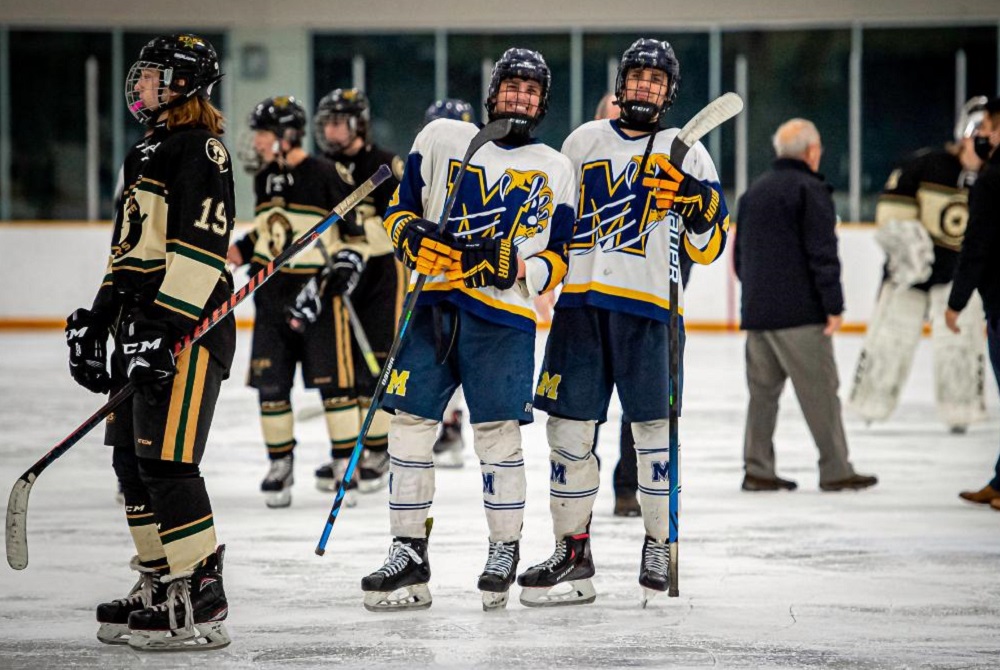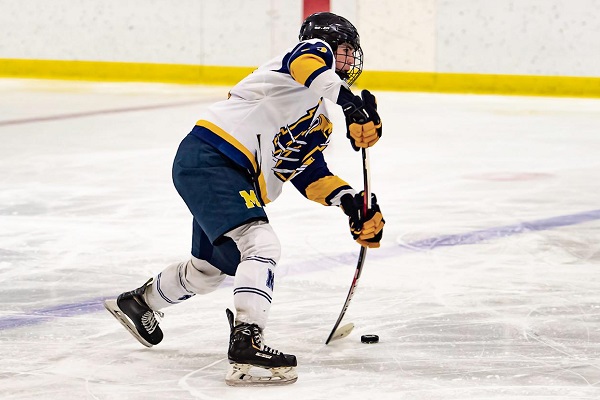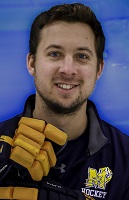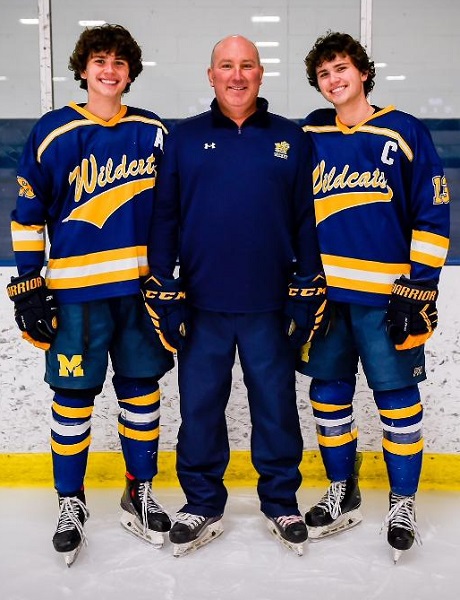
Kruzich Family Connections Run Deep Through Mattawan Hockey, Rivalry
By
Pam Shebest
Special for MHSAA.com
January 17, 2023
MATTAWAN — When this season’s South Central High School Hockey League schedule was announced, twins Kaleb and Zach Kruzich immediately circled Feb. 15.
 That’s the red-letter day their Mattawan Wildcats face off against the Kalamazoo Eagles, coached by their uncle, Matt Kruzich.
That’s the red-letter day their Mattawan Wildcats face off against the Kalamazoo Eagles, coached by their uncle, Matt Kruzich.
“When Matt told me he was coaching the Eagles (three years ago), he said, ‘I don’t even want you to look at me (during the game),’” Zach Kruzich laughed.
“‘I don’t even want to talk to you at the rink,’ which is perfectly fine by me.”
Adding to the family dynamics, the twins’ father, Bart, is assistant coach with Wildcats’ head coach, Chris Dienes.
“We always really get up for that game, for sure,” Bart Kruzich said. “They beat us last year, so we definitely remember that. It’s always a big game.”
Off the ice, it is back to family.
“We all live on the farm, so we’re all very close and see each other every day,” Matt Kruzich said.
In addition, Dienes and Matt Kruzich are roommates.
“Out of hockey, most of the topics are about fantasy football than hockey,” Kaleb Kruzich said.
Hockey aside, the twins are, so far, the last of four generations of Wildcats.
Their great-grandmother, the late Emma Papierz Kruzich; their grandfather John Kruzich, and their dad all graduated from Mattawan High School.
 As for hockey, “We were born into it,” laughed Zach Kruzich.
As for hockey, “We were born into it,” laughed Zach Kruzich.
Their dad played for the Junior K-Wings from 1991-93.
Uncle Matt played professionally for the United Hockey League Kalamazoo Wings in 2002-03.
Oldest brother Jake also played for the Wildcats before continuing as a student only at Michigan State.
Dienes, in his second year as the Wildcats’ head coach, also brings a wealth of hockey experience to the team.
After playing at Western Michigan University from 2013-17, he played professionally for the ECHL’s Adirondack Thunder and Jacksonville Icemen, and then with the American Hockey League’s Manitoba Moose in 2017-18.
The twins figure this is their last year of organized hockey — they are not planning to play in college — so they are going all out.
Kaleb is a left-handed defenseman wearing No. 13, and Zach a right-handed forward sporting No. 19.
That is the easiest way the tell them apart.
“My grandparents can never tell who’s who on the ice,” Kaleb said. “They need our numbers. A lot of the fans are the same. They need a roster to differentiate.”
Dienes said he also has trouble telling the twins apart.
“Sometimes I get caught yelling at one and it’s not the right one, but I can tell them apart on the ice easy,” he said.
The twins complement each other during games, but practices are quite a bit different.
“I’m always like, ‘Can I skip you so I can go against Kaleb?’” Zach said. “In games, we’re just teammates.”
 Kaleb also looks forward to practices, saying he and his brother grew up competing against each other.
Kaleb also looks forward to practices, saying he and his brother grew up competing against each other.
“We definitely try our hardest against each other in practice,” he said. “Definitely some slashes, some punches thrown on the ice, just like quick stuff. It happens. Brothers being brothers, especially when we’re the same age.”
Dienes and Bart Kruzich have an understanding when it comes to coaching.
“He does a good job,” Dienes said. “He allows me to do the coaching of them for the most part. It’s a good mix of me being bad cop sometimes and him being good cop, which is good for him as a dad.”
Bart Kruzich said he talked at length with Mattawan athletic director Chad Yager and Dienes before agreeing to become assistant coach.
“For the most part, I don’t really coach a lot to my own kids. That was an agreement I made with Chris and Chad Yager,” Bart Kruzich said.
“I’m probably harder on my own kids than I am on the others. They’re used to it. It’s been like that since they were 6 years old, and now they’re 18.”
So far, the Wildcats have a 7-4-2 record, 5-1 in the league, where they and Jackson Lumen Christi are the only teams who are not cooperative programs. The co-ops are the Portage Muskies, Kalamazoo United, Kalamazoo Eagles, Kalamazoo Blades, Capital City, and Eastside.
“Our numbers have actually grown over the years,” Dienes said of his team. “When I first started as an assistant (two years ago), we had 21 kids try out.
“Last year we had 39, and this year we had 40. I think that number is going to continue to grow over the years, so it’s exciting.”
The Wildcats won their first playoff game in 10 years last season and hope to build on that.
 “The twins and our senior leaders – Colin Swintz, Colin O’Reilly, Aidan Warn and Niko Lewis – have really led the charge,” Dienes said.
“The twins and our senior leaders – Colin Swintz, Colin O’Reilly, Aidan Warn and Niko Lewis – have really led the charge,” Dienes said.
Juniors are Colin Porn, Matt Novak, Landis Mills, Jake Mandeville, Gavin Mckeeby, Brody Schripsema, Nathan Whitehead, Nicholas Amos and Edmond Lafleche. Sophomores are Dom Vezeau, Carson Mattern, Carson Smith, Caden Byers, Kibwe Weaver and Brayden Lewis.
Zach Kruzich said most of his teammates have played together since youth hockey which, along with being at the same school, is a big advantage.
Another strength is team depth, Bart Kruzich said.
“This year, we have 13 forwards and six defensemen, and we feel like we can put any of those 13 forwards out there and we’re competitive with all 13 of those kids,” he said.
“When we get into a good game, we can roll three and one-half lines and kind of tire teams out. Our talent pool is pretty deep.”
While the twins are enjoying their senior year on the ice, neither plans to continue hockey in college. Both hope to attend Miami of Ohio, joining their sister Katie and leaving their parents as empty nesters.
Meanwhile, hockey tends to be the topic of the day at home.
“After games, we go home and (Dad) loves watching (tapes of) the games, sometimes a little too much, but we talk about it,” Zach Kruzich said.
Bart Kruzich said his wife, Kristen, is a super fan.
“I give her a lot of credit,” he said. “She’s always been awesome at really encouraging the team, especially the twins.
“She doesn’t pay attention to only her kids; she really been supportive of the whole team.”
 Pam Shebest served as a sportswriter at the Kalamazoo Gazette from 1985-2009 after 11 years part-time with the Gazette while teaching French and English at White Pigeon High School. She can be reached at [email protected] with story ideas for Calhoun, Kalamazoo and Van Buren counties.
Pam Shebest served as a sportswriter at the Kalamazoo Gazette from 1985-2009 after 11 years part-time with the Gazette while teaching French and English at White Pigeon High School. She can be reached at [email protected] with story ideas for Calhoun, Kalamazoo and Van Buren counties.
PHOTOS (Top) Twins Zach (left) and Kaleb Kruzich take a moment for a photo during a Mattawan game night. (2) Kaleb Kruzich winds up to shoot. (3) Mattawan hockey head coach Chris Dienes. (4) Zach Kruzich, left, stands with dad and assistant coach Bart Kruzich and brother Kaleb. (Photos by Avian Townley.)

Officials Eager for New Hockey Format
July 12, 2019
By Rob Kaminski
MHSAA benchmarks editor
Tuesday, Feb. 26, was a particularly busy day on the ice as the 2019 MHSAA Ice Hockey Tournament reached just its second day around the state.
On the slate that night were 27 Regional games, bringing the two-day total to 48 on the heels of Monday’s busy calendar.
As teams were busy setting their sights on the ultimate goal, so, too, was another group of accomplished skaters who toil with much less fanfare. Nonetheless, the games can’t start without them – the folks in the striped shirts who call the games.
Just as players and coaches will welcome the expanded playoff format in 2020, the officials are looking forward to the change as well.
“When we got to the first week of the tournament, it seemed like we were going every day,” said Jim Gagleard, who assigns officials for the Livonia Ice Hockey Officials Association. “There are only so many officials to go around in any sport. By allowing us as officials a day or two to catch our breath, it’s good. Good for us, and good for players more than anything.”
If it seemed like every day, well, it was. A total of 66 games were played over the first three days, and 89 over the first four. Considering each game at the Regional level has three officials, that computes to 267 officials needed during that span. On the busiest day, 81 had to take to the ice.
Given that there were a total of 302 playoff-eligible officials in 2019, filling those slots can be a logistical nightmare for assigners at times.
“Regional week will see a huge burden alleviated for officials and especially assigners. There will be so much more flexibility under the new format,” said Dan DiCristofaro, President of the Northeast Hockey Referees Association. “Last year, we were faced with so many doubleheaders at single sites, and the first games needed an early start so that the second games would not last late into the evening on school nights.
“At times, the most important factor for the assigner was scheduling those officials who could get to the arena for the early start times. Merit and ability sometimes had to take a back seat.”
Gagleard agrees, saying, “Assigning-wise, early games are the toughest to fill. Everyone has a job, and in order to work a game they have to tell the boss they’re leaving at 2:30 for a 5 o’clock game. You start to look for officials who are retired, or can get out of work, instead of the most qualified. That’s not fair to the teams playing.”
In the northern reaches of the Upper Peninsula, the problem is more acute.
Sean Jacques is the athletic director at Calumet, and also an experienced official, having skated the Division 2 Final in Plymouth in 2016.
“Not enough,” Jacques said, in reference to the number of playoff officials in the UP. “Not enough. When I get the list of eligible officials that is sent to tournament managers, I have to search and scramble to find three people within an 80-mile radius.”
Moving the Quarterfinals to the weekend will definitely help matters, and eliminating Regional doubleheaders should ease the scheduling anxiety as well.
 “With Regionals spread out more, without doubleheaders, officials potentially could work more days,” Jacques said. “And there should be more availability for the Quarterfinals. The last few years, it was in the Sault, and getting four guys to the Sault on a weeknight, whether from Escanaba or northern lower Michigan, was difficult. There were times I’d turn down a Quarterfinal because I just couldn’t get there and back and make it to work the next day. Saturday makes it easier.”
“With Regionals spread out more, without doubleheaders, officials potentially could work more days,” Jacques said. “And there should be more availability for the Quarterfinals. The last few years, it was in the Sault, and getting four guys to the Sault on a weeknight, whether from Escanaba or northern lower Michigan, was difficult. There were times I’d turn down a Quarterfinal because I just couldn’t get there and back and make it to work the next day. Saturday makes it easier.”
On the west side of the Lower Peninsula, assigner Randy Sheahan uses a mathematical approach to illustrate his challenges, even for the regular season. Sheahan calculates that 98.88 percent of all West Michigan games are scheduled for Wednesday, Friday, or Saturday. Breaking it down further, 84.39 percent skip Wednesday and schedule only Friday or Saturday.
With the shortened regular season coming in 2019-20 to allow for a three-week tournament window, Sheahan took a proactive approach.
“When the MHSAA announced the change to a three-week tournament, I emailed all West Michigan coaches, plus a handful of athletic directors and booster leaders who may be involved in team scheduling,” Sheahan said. “I encouraged them if they are having difficulty squeezing all their games into a window which is now one week shorter, to give further consideration to playing on Mondays, Tuesdays, or Thursdays to greatly alleviate some of the stresses we place on the West Michigan officiating staff.”
As for the MHSAA Tournament, Sheahan agrees with his brethren across the state in metro Detroit that the expansion will benefit assigners, officials, and teams.
“I only see positives,” Sheahan said. “This gives me tremendous flexibility with our staff to maneuver around their professional and personal schedules to keep our best officials on the ice every round, which is an expectation teams have for playoffs. It also provides (at times) much needed rest for officials and teams, especially if they are involved in overtime affairs. This could help with the quality of overall game play.”
That’s the goal for everyone. Fresher legs for players and officials alike will provide a better experience for all involved.
“This allows for physical recovery for everyone on the ice,” said DiCristofaro. “It also allows for better time management for student-athletes, officials and coaches. Even at the Quarterfinal offerings with four officials for each game, we’d run into issues as far as which people could get to places, or wanted to travel and skate late on a work night. Saturday give us much more flexibility and should create more interest in the state tournament.”
The Quarterfinals, Semifinals and Finals have employed a four-official system in recent years, affording an extra position each game for deserving officials while adding to the quality of the game for participants at the highest level.
Sheahan plans to utilize the new format to continue to reward those among his troops who have earned their stripes for such contests.
“In theory, I may have opportunities to increase game counts for some of our perennial playoff officials, but I have no plans to do that,” Sheahan said. “We have other officials every season who are good enough to skate playoffs and have earned it, but simply couldn’t quite break the playoff bubble. Now the opportunity presents itself to reward some of those officials. It would be counterproductive to officiating development if fewer officials are getting opportunities for important games.”
Similarly, DiCristofaro is hoping the time will come when four officials will be assigned to skate Regional Finals, and perhaps the new length of the postseason will open the door.
“Some of most important games are the Regional Finals. Maybe this new schedule can help,” DiCristofaro said. “Four officials offer teams the best possible ice coverage, and they deserve that.”

